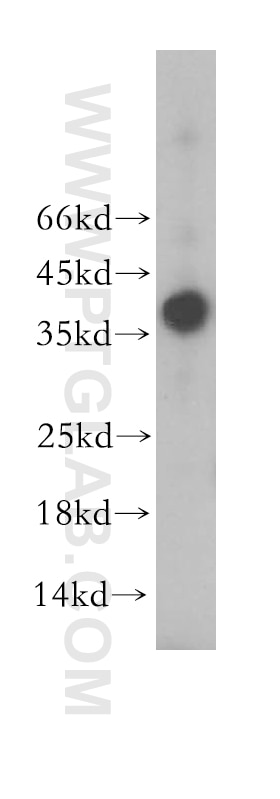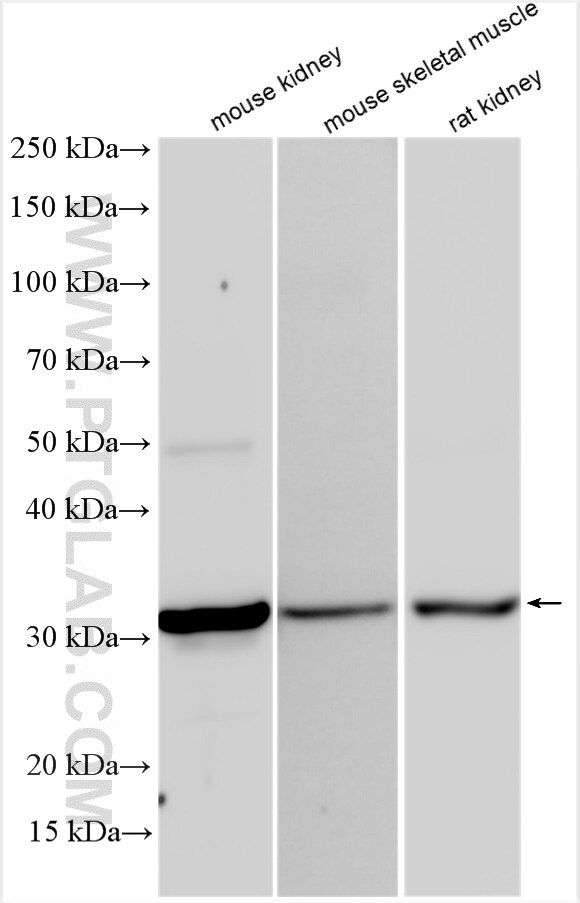Anticorps Polyclonal de lapin anti-PSCA
PSCA Polyclonal Antibody for WB, ELISA
Hôte / Isotype
Lapin / IgG
Réactivité testée
Humain, souris
Applications
WB, ELISA
Conjugaison
Non conjugué
N° de cat : 17171-1-AP
Synonymes
Galerie de données de validation
Applications testées
| Résultats positifs en WB | tissu rénal de souris, cellules PC-3, tissu de muscle squelettique de souris |
Dilution recommandée
| Application | Dilution |
|---|---|
| Western Blot (WB) | WB : 1:500-1:2000 |
| It is recommended that this reagent should be titrated in each testing system to obtain optimal results. | |
| Sample-dependent, check data in validation data gallery | |
Applications publiées
| KD/KO | See 1 publications below |
| WB | See 3 publications below |
Informations sur le produit
17171-1-AP cible PSCA dans les applications de WB, ELISA et montre une réactivité avec des échantillons Humain, souris
| Réactivité | Humain, souris |
| Réactivité citée | Humain, souris |
| Hôte / Isotype | Lapin / IgG |
| Clonalité | Polyclonal |
| Type | Anticorps |
| Immunogène | PSCA Protéine recombinante Ag10710 |
| Nom complet | prostate stem cell antigen |
| Masse moléculaire calculée | 123 aa, 13 kDa |
| Poids moléculaire observé | 36 kDa |
| Numéro d’acquisition GenBank | BC023582 |
| Symbole du gène | PSCA |
| Identification du gène (NCBI) | 8000 |
| Conjugaison | Non conjugué |
| Forme | Liquide |
| Méthode de purification | Purification par affinité contre l'antigène |
| Tampon de stockage | PBS with 0.02% sodium azide and 50% glycerol |
| Conditions de stockage | Stocker à -20°C. Stable pendant un an après l'expédition. L'aliquotage n'est pas nécessaire pour le stockage à -20oC Les 20ul contiennent 0,1% de BSA. |
Informations générales
Prostate stem cell antigen (PSCA) is a protein composed of 123 amino acid residues. PSCA belongs to the LY-6/Thy-1 family of cell surface antigens. It is highly expressed in normal prostate and further up-regulated in prostate cancer, as well as non-prostatic malignancies including gastric cancer. PSCA plays a critical role in cell adhesion, proliferation, and survival. The obasrved MW of PSCA is between 36 to 40 kDa in paper (PMID: 11309275).
Protocole
| Product Specific Protocols | |
|---|---|
| WB protocol for PSCA antibody 17171-1-AP | Download protocol |
| Standard Protocols | |
|---|---|
| Click here to view our Standard Protocols |
Publications
| Species | Application | Title |
|---|---|---|
Endocrinology mTOR regulates mineralocorticoid receptor transcriptional activity by ULK1- dependent and independent mechanisms | ||
PLoS One Pan-cancer analysis of PSCA that is associated with immune infiltration and affects patient prognosis
| ||
J Immunother Cancer Impact of tumor localization on antitumor immunity with conditionally activated CTLA-4 blockade |



